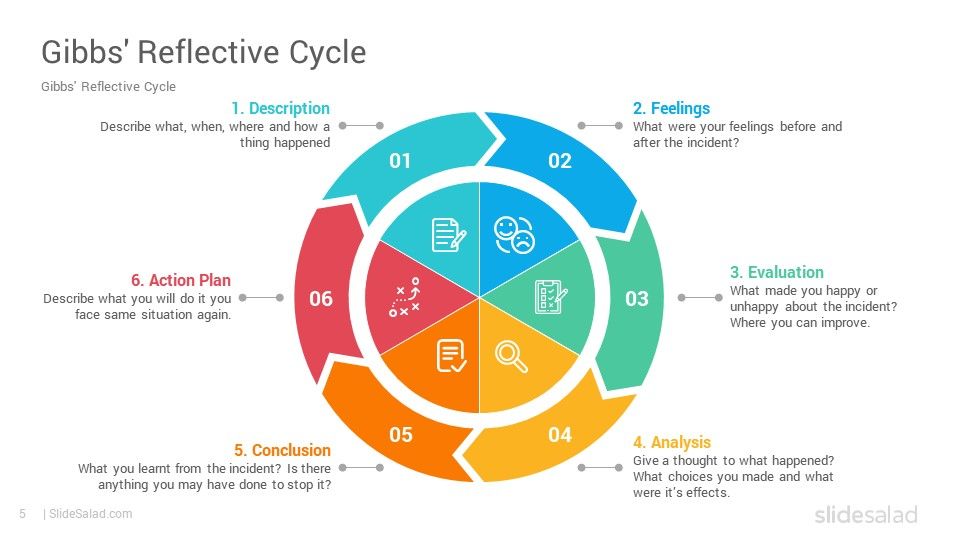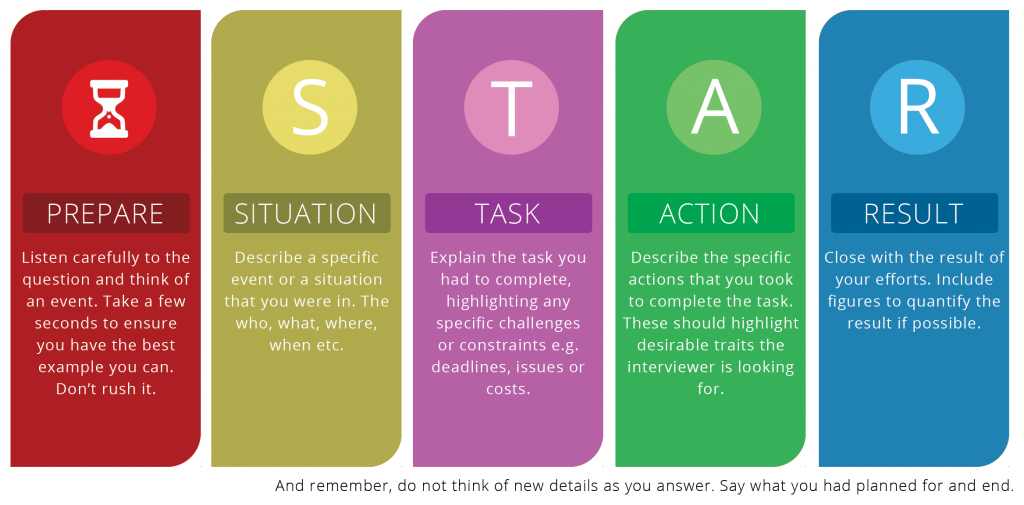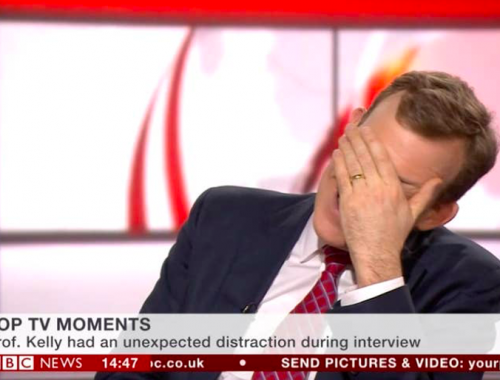S.T.A.R. Quality Interviews!
Picture it; your dream job, your calling, nothing more you could want. You’ve put in the work, you’ve got the grades, ability, drive. All you must do is prove it. Simple… Isn’t it?
However, unfortunately for me, and perhaps many others, this is often when the dreaded interview is introduced.
TOO MUCH PRESSURE.
Those crucial few minutes during which you are required to present your best self. Look your best, speak you best, present your best qualities. All the while the beady eyed panel observing and scrutinising your every move. Like a hawk, but rather than searching for prey, they are prying for faults. Only seven seconds before a first impression is made (Gibbons 1). It all seems like too much to handle. Especially when your dream job is on the line.
But fear not! Lucky for you, you have been graced with the opportunity to learn from my mistakes! Through utilising Gibbs’ reflective model, I will here reflect upon the error of my ways, in addition to those areas which weren’t quite as bad.
Context:
The position I was interviewing for was a ‘Teacher of English’ at The Totteridge Academy, London. Listed in the job description were details of skills and qualities the school has identified as priority to this role; teamwork, creativity, motivation and ambition to name a few. As proposed by Georgia Hardavella a successful candidate would mirror these desired qualities in response to questions posed by the assessors, whilst outlining their relevant experience within the role (Hardavella 3).
Does this sound like a lot to think about at once? I thought so too. (Initially!)


However, I quickly discovered that utilising the STAR technique, enables the manipulation of responses to ensure all targets are met. (Whitacre 72)
This is a simplistic and methodical approach to answering interview questions and should hopefully lessen some of the overwhelming fear which interviews often induce.
Feelings:
Recognising nerves as a typical personal downfall, I decided to channel a large portion of research in this area. I found useful information on altering perceptions. For example, QUB Student Guidance Centre outlines that the interview process is a two-way conversation. Whilst assessors aspire to become acquainted with candidates, this equally is an opportunity for the candidate to become acquainted with the organisation.
Additionally, it is important to remember, “If you are asked to interview, it means that on paper you look excellent, […] you have a good chance of getting offered a place.” (Murphy 1). Perhaps indicating that personal presentation and the manner in which candidates convey information is highly influential to a successful interview.
Evaluation:
And just like that, the day arrived. The countless hours in the library, racking my brain thinking of potential questions and appropriate responses had finally come to an end.
Despite the extreme anxiety I have previously faced during interviews, this occasion was different. Whilst I still definitely experienced feelings of nervousness, the extent of this was not debilitating.
I hit the key criteria that Totteridge Academy was looking for, for example, when asked on how I would go about assisting pupils who were struggling in a particular area, I was given the opportunity to talk about my role in assisting in a targeted intervention such as aiding pupils who data from CAT tests had suggested would benefit from additional literacy support. Then discuss the steps I took within one-to-one support lessons with these pupils. Doing this enabled me to illustrate areas where I developed skills of creativity and increased aspirations of pupils; key skills the job description included.
Throughout each of the questions asked I was able to curate a response following the STAR technique, encompassing negative elements of an answer with positive information on how situations were dealt with in order to obtain an overall positive outcome.
Evident in my response to a scenario-based question about adapting to new circumstances:
SITUATION – Whilst on placement at Limavady Grammar School, open days to display the school to potential Year 8 pupils were prohibited as a result of Covid-19 restrictions.
TASK – I had to help to come up with an alternative method to showcase all LGS has to offer.
ACTION – Create a video, encouraging pupils from all year groups and staff from all departments to get involved.
RESULT – Through a collaborative effort, working with different departments (English – scriptwriting, Digital Technology – editing etc) we were able to curate an impressive school produced video; showcasing LGS’s unique attributes. Through doing this skills of communication and teamwork were enhanced.
Analysis:
However, what was notable was my struggle in the concluding answers. My confidence, whilst it had increased ten-fold in comparison to previous interviews, unfortunately here exhibited a trend of timidness towards the end of responses in the last few questions. Having now received peer feedback, and acknowledged this fault, when it comes to future interviews this is something I will pay particular attention to. Whilst I was able to provide detailed answers which were relevant and specific to the question asked, I have evaluated that the manner in which this information is conveyed is of equal importance. “Skills can be taught, passion cannot” (Turesol 4).
Conclusion and Action Plan:
In accordance with peer feedback, to prevent the reoccurrence of this I would conclude answers by referring back to the question. I would tackle the cautious ending of responses by altering their structure; finishing on stronger arguments. I appreciate the importance of avoiding repetition and aspiring for variation, therefore I aim to save some more confident points for the interviews conclusion. Furthermore, I would aim to remove less relevant points to prevent rambling thus boosting confidence in communication.
What have you got to lose? If you want something you have to put yourself out there, being methodical and enthusiastic in your approach.
Practice makes perfect.
If you don’t try you’ll never know. And if you never know, will you ever learn?
Bibliography:
Finlay, Linda. Reflecting on ‘Reflective practice’. Practice-based Professional Learning Paper 52, The Open University, 2008. Web. Accessed 15th Feb 2022.
Gibbons, Serenity. “You and Your Business Have 7 Seconds to Make a First Impression: Here’s How to Succeed.” Forbes, Forbes Magazine, 10 Dec. 2021, https://www.forbes.com/sites/serenitygibbons/2018/06/19/you-have-7-seconds-to-make-a-first-impression-heres-how-to-succeed/?sh=7909f66956c2. Web. Accessed 15th Feb 2022.
Hardavella, Georgia et al. “How to prepare for an interview.” Breathe, vol. 12,3 (2016): 86-90, 2016. Sheffield: England. Print.
Hattie, John and Jaeger, Richard. ‘Assessment and Classroom Learning: A Deductive Approach. Assessment in Education: Principles, Policy and Practice’, 5:1, 111–122, 1998. Print.
Murphy, Kevin G. “The Panel Interview: What to Expect and How to Prepare.” BMJ: British Medical Journal, vol. 350, BMJ, 2015, https://www.jstor.org/stable/26973516. Web. Accessed 9thFeb 2022.
Whitacre, Teresa. “Behavioral Interviewing-Find Your STAR.” Quality Progress 06 2007: 72-3. ProQuest. Web. Accessed 15th Feb. 2022.
“Why Passion Is the Most Important Credential When Looking for a Job.” Turesol Staffing Solutions, 7 Nov. 2017, https://turesol.com/passion-when-looking-for-a-job/. Web. Accessed 10th Feb 2022.
You May Also Like

So You Want To Be A Teacher?
17 February 2022
When the BBC thinks you live in the Atlantic – My Simulated Interview
17 February 2022

